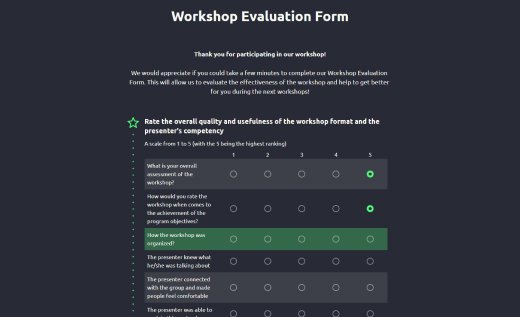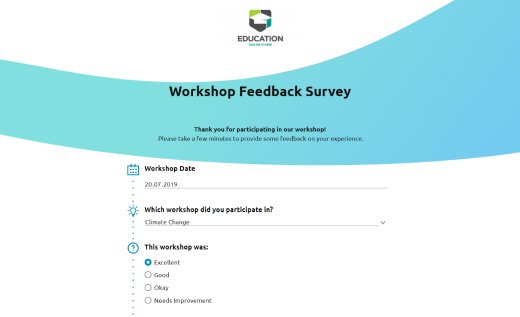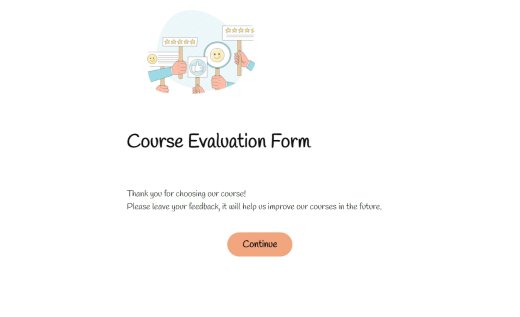Workshop Evaluation Form Template
This generic workshop evaluation questionnaire helps you see how your session went, what participants learned and what you can improve. It works for any event — from staff training to professional development workshops. You can customize the sample form in a drag-and-drop editing tool without any coding. The free AidaForm plan already includes the key fields you need: Matrix for rating many aspects without making the form too long and Rating for quick scores on any part of your workshop.
AidaForm also offers advanced options like Conditional Fields, which reveal extra questions only when needed, and Custom Thank You Pages, where you can add text, images or links to your website, blog or social media. See these features in action on the Workshop Feedback Form Template page.
How to Evaluate a Workshop Effectively
Workshop evaluation is essential for understanding how effective your session was. Did it meet participants’ expectations? Were there any technical issues? Were the contents relevant and easy to understand? Asking people to review your workshop helps you attract attention to your offering, identify and correct mistakes, and improve the structure to cover more useful material.
You can hold workshops on anything from team building to growth hacking — just don’t forget to gather feedback. Here are a few simple tips on how to create a workshop evaluation form that collects meaningful insights and is easy for students to follow.
Start Your Questionnaire with an Introduction
Remind participants of the workshop details before asking questions. You can add the following information using the Text field:
- Theme
- Date
- Venue
- Name of the trainer
Tip: If there were several trainers, specify which parts each trainer led.
Fill Your Form with the Most Relevant Questions
Think about what you need to know before you write the questions. Relevant information helps you improve future workshops and create better experiences. Keep the form short and your questions clear and direct.
Here are some dos and don’ts for questions you include in a workshop evaluation survey:
1. Avoid compound questions.
These are long, complex questions with multiple ideas. For example:
Would you prefer the workshop to be held on Wednesday and Thursday for two hours or on Saturday for four hours, or are you fine with both?
This question is difficult to read. With this wording, it is difficult for the respondent to provide a clear answer. They may only understand part of the question, resulting in an incomplete and unreliable answer.
Tip: Break compound questions into separate ones or simplify the wording:
How would you like the workshop to be scheduled in the future?
- 2 two-hour sessions on Wednesdays and Thursdays
- 1 four-hour session on Saturdays
- Both options are fine
- I would prefer different dates (please specify)
2. Don’t ask leading questions.
Leading questions push respondents toward a certain answer and make results less objective. For example:
You took part in our workshop. Based on your experience, would you say you were extremely satisfied with its contents?
Tip: Do not ask questions that imply a desired answer. Remain neutral. For example:
Based on your experience, how satisfied were you with the content of the workshop?
3. Be careful with multiple-choice questions.
When using multiple-choice questions for evaluation, keep in mind that offering too few answer options can limit respondents and make the question difficult to answer. At the same time, providing too many options can overwhelm them and slow down the evaluation process.
It’s also important to consider the order of the answer choices. Use a logical, predictable sequence whenever the options follow a natural progression — such as numeric scales, time ranges, levels of agreement or any ordered categories that support clarity. Randomize the options only when they have no inherent order, for example when listing brands, features or names. In these cases, shuffling helps reduce response bias and ensures that all options receive equal attention.
Tip: Add an “Other” option when respondents may need to specify an alternative answer.
4. Include open-ended questions
Without at least one open-ended question, you risk missing valuable insights. These questions give participants the freedom to highlight what worked well, suggest improvements or mention something you may not have thought to ask.
Tip: Include at least one open-ended question. If the workshop had several parts, consider asking for free-form feedback on each segment.
Evaluate the Workshop After and Long After
After means collecting feedback immediately, while impressions are fresh. Ideally, do the workshop evaluation online: share the form link during the session, remind participants at the end and send a follow-up email within two days.
Long After means evaluating the workshop 2–3 months later. Not all workshop providers do this, but it’s useful because it shows long-term impact. For example:
- Have you been able to apply the knowledge gained at the workshop at work?
- What effect did this knowledge have on your work practices?
Reaching out again also reminds past participants about your workshops and may encourage them to join other sessions, especially if it’s part of a series that leads to a completion certificate.


